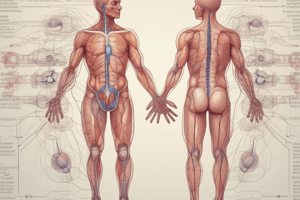Podcast
Questions and Answers
What is the primary function of the kidneys?
What is the primary function of the kidneys?
- Regulating electrolyte balance
- Producing and storing urine
- Filtering wastes and excess fluids (correct)
- Maintaining blood pressure
Which part of the kidney is responsible for filtering blood and maintaining water and electrolyte balance?
Which part of the kidney is responsible for filtering blood and maintaining water and electrolyte balance?
- Nephrons (correct)
- Renal Artery
- Renal Cortex
- Renal Medulla
Where are the kidneys located in the body?
Where are the kidneys located in the body?
- Below the spine
- Near the heart
- Just above the ribcage (correct)
- Adjacent to the liver
What is the average weight of the kidneys?
What is the average weight of the kidneys?
What is the main role of the kidneys in regulating blood pressure?
What is the main role of the kidneys in regulating blood pressure?
Which condition is characterized by small, hard deposits that form in the kidneys and can cause pain and blockages?
Which condition is characterized by small, hard deposits that form in the kidneys and can cause pain and blockages?
What type of cancer can develop in the kidneys?
What type of cancer can develop in the kidneys?
Flashcards are hidden until you start studying
Study Notes
Kidney: The Powerhouse of the Body
The kidneys are two essential organs located on either side of the spine, just below the ribcage. They are bean-shaped and about the size of a fist, with an average weight of 150 grams. Kidneys perform various functions in the body, including maintaining blood pressure, regulating electrolyte balance, controlling acid-base balance, and filtering wastes and excess fluids.
Anatomy
The kidneys have a complex structure, including the renal cortex, renal medulla, nephrons, and renal artery.
- Renal Cortex: The outer layer of the kidney.
- Renal Medulla: The inner layer of the kidney.
- Nephrons: The functional units of the kidney, responsible for filtering blood and maintaining water and electrolyte balance.
- Renal Artery: The blood vessel that brings blood to the kidneys.
The kidneys are connected to the ureters, which transport urine to the bladder, allowing for the storage and eventual excretion of urine from the body.
Physiology
The kidneys perform several vital functions in the body, including:
- Urine formation: The kidneys filter 120 to 150 quarts of blood every day, producing 1 to 2 quarts of urine.
- Electrolyte balance: The kidneys help maintain a balance of electrolytes, including sodium, potassium, and chloride, in the body.
- Blood pressure regulation: The kidneys play a significant role in regulating blood pressure by controlling the release of renin, a hormone that helps regulate blood pressure.
- Acid-base balance: The kidneys help maintain the pH balance of the blood by excreting acids or bases, depending on the body's needs.
The kidneys work in concert with other organs, such as the liver and adrenal glands, to maintain overall health and balance in the body.
Kidney Diseases
Several diseases can affect the kidneys, including:
- Kidney stones: Small, hard deposits that form in the kidneys and can cause pain and blockages.
- Acute kidney injury (AKI): A sudden loss of kidney function due to various factors.
- Chronic kidney disease (CKD): A long-term condition that slowly damages the kidneys over time.
- Kidney cancer: A type of cancer that can develop in the kidneys.
Regular check-ups and monitoring can help detect potential issues early and maintain kidney health.
Studying That Suits You
Use AI to generate personalized quizzes and flashcards to suit your learning preferences.




